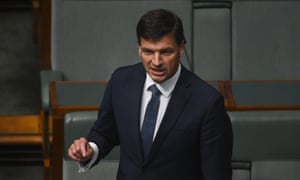Energy minister says Coalition’s approach is ‘not to have a target without a plan’ to achieve it
Angus Taylor
says it is not Australia’s policy to achieve net zero emissions by
2050, despite signing up to the Paris agreement, because the Morrison
government will not adopt a mid-century target in advance of a plan to
achieve it.
The energy minister said on Tuesday that signatories to the Paris agreement, including Australia, had agreed to hit net zero “in the second half of the century”. But scientists say in order to meet the central Paris goal of keeping a global temperature rise this century well below 2C above pre-industrial levels and to pursue efforts to limit the temperature increase even further to 1.5C – a commitment Australia adopted in 2015 – signatories need to hit net zero by 2050.
A new review of the government’s climate policies headed by former Business Council of Australia president Grant King
notes that “like other signatories to the Paris agreement, Australia
has agreed to adopt progressively more ambitious targets beyond 2030 and
has endorsed the agreement’s overarching long-term goals, namely to
limit the global temperature rise to well below 2C – and if possible
below 1.5C – by achieving net zero emissions as soon as possible in the
second half of the century”.The energy minister said on Tuesday that signatories to the Paris agreement, including Australia, had agreed to hit net zero “in the second half of the century”. But scientists say in order to meet the central Paris goal of keeping a global temperature rise this century well below 2C above pre-industrial levels and to pursue efforts to limit the temperature increase even further to 1.5C – a commitment Australia adopted in 2015 – signatories need to hit net zero by 2050.
Major business groups, including the Business Council of Australia and the Ai Group, say Australia should adopt the net zero by 2050 target. Earlier this month the Ai Group called for the two biggest economic challenges in memory – recovery from the Covid-19 pandemic and cutting greenhouse gas emissions – to be addressed together, saying it would boost growth and put the country on a firm long-term footing.
Every Australian state has signed up to net zero emissions by 2050, and these commitments are expressed either as targets or aspirational goals.
But asked on Tuesday whether net zero by 2050 was the federal government’s policy, Taylor said: “No.”
“Our approach is not to have a target without a plan,” Taylor told the ABC. He said technology improvements would drive significant reductions in emissions “and we’d love to be able to achieve net zero by 2050, but ultimately that will depend on the pathways of technology to deliver that without damaging the economy”.
The King review has recommended new approaches to reducing pollution including paying big emitters to keep their emissions below an agreed limit, and allowing businesses to bid for funding from the government’s climate policy – the $2.55bn emissions reduction fund – for projects that capture emissions and either use them or store them underground.
The King review proposal to pay emitters to remain below their baseline looks like a voluntary carbon trading mechanism. The review says the idea “could be achieved by crediting emissions reductions below baselines and providing for the sale and purchase of … safeguard mechanism credits by the federal, state or territory governments or through voluntary transactions in carbon markets”.
Despite that clear description in the review, Taylor contended initially on Tuesday the proposal was not a form of voluntary carbon trading. He said the review proposed a “carrot” to give companies an incentive to overachieve on their pollution reduction commitments.
The Coalition has spent a decade opposing carbon pricing, and it abolished the emissions trading scheme legislated during the Gillard government. Rightwingers in the Liberal party also moved against Malcolm Turnbull’s leadership in part because he pursued a policy to reduce emissions in the electricity sector.
But after first saying the King proposal was not a form of carbon trading, the energy minister then argued that principle was “nothing new”. “You can trade Australian carbon credit units now. There is nothing new with that, that’s a pre-existing system we have through the emissions reduction fund.”
It is unclear whether some of the proposals in the review would garner majority parliamentary support, but Taylor said some of the proposals might be able to be achieved without changing legislation.

No comments:
Post a Comment